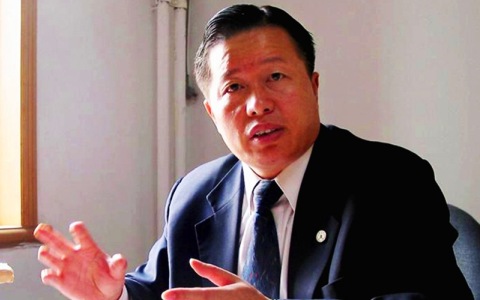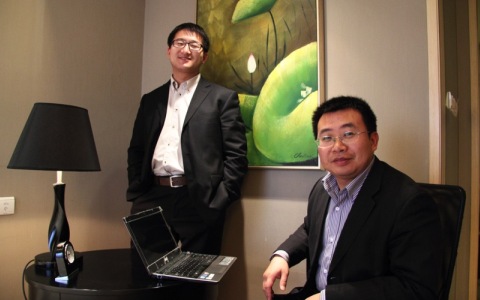Zhisheng released but human rights lawyers are still being ‘disappeared’
by - 14th August 2014

LAWYER, Nobel Peace Prize nominee and Christian lay leader Gao Zhisheng, who has defended the Falun Gong and other religious minorities, has been released after three years in jail but he and other lawyers defending religious freedoms continue to face intimidation from the Chinese government.
Zhisheng, 50, left the remote Shaya Prison in Xinjiang on Thursday 7 August after completing a three-year sentence for ‘inciting to subvert state power’ - a charge often used by China against government critics, say Human Rights Watch.
He is now said to be staying at his father-in-law’s home in Urumqi but with a conditional freedom.
According the US-based Chinese human rights campaigner, Bob Fu, his wife, Geng He spoke to Zhisheng but could tell that security officers were with him.
‘Zhisheng is still far away from true freedom,’ says Fu, a former Tiananmen protester and refugee, who now runs China Aid.
Restrictions
Another Beijing-based human rights activist, Hu Jia, told reporters: ‘He will not be given real freedom. The Communist Party worries Zhisheng will become a leading rights defender, so the restrictions on him will be long-term.’ Fu told Radio Free Asia that security police have forbidden Gao from speaking to the media.
Zhisheng is now expected to seek asylum in the United States to be with his wife and two children, who escaped China five years ago.
He has become one of China’s highest profile dissidents, but he is just one among many human rights lawyers and activists who have been arrested, ‘disappeared’ and claim to have been tortured.
Other prominent human rights lawyers in China are also subject to frequent arrest and harassment. Amnesty International has accused China of clamping down on lawyers involved in cases critical of the Chinese authorities. In their report, Against the law – Crackdown on China’s Human Rights Lawyers Deepens Amnesty say lawyers who refuse to back off face losing their licence, criminal charges, detention or disappearance – as happened to Zhisheng.
Torture
‘Human rights lawyers are subject to escalating silencing tactics - from suspension or revoking of licences, to harassment, enforced disappearance or even torture,’ said Amnesty’s International’s Asia Pacific Deputy Director, Catherine Baber.
Liberty groups say the clampdown against lawyers intensified in the months after the Arab Spring revolutions, when China began to fear a ‘Jasmine Revolution’ of its own. Many were rounded up, and many claim to have been tortured to try to intimidate them.
Amnesty claims that intimidation is working, and few are now willing to defend victims of religious persecution, including the banned Falun Gong, Muslim Uighurs and Tibetan and Christian activists.
Falun Gong is a spiritual discipline derived from Buddhist tradition that quickly attracted a lot of followers after its introduction to China in 1992. Its followers have been putting pressure on the government to recognise the practice.
‘Political oppression and violation of human rights defenders and lawyers has worsened in the last few months,’ says Fu.
Detained
According to reports from the pro-democracy pressure group Chinese Human Rights Defenders, there have been upwards of 1,600 cases since 2012 of Chinese human rights activists ‘detained for at least five days, and in some cases tortured or mistreated.’
A recent high-profile case was linked to the twenty fifth anniversary of the Tiananmen Square massacre. Lawyer Pu Zhiqiang was detained in May for commemorating the crackdown against the pro-democracy movement, when the authorities sent in tanks to suppress the demonstrations.
In March, four human rights lawyers were arrested after investigating alleged abuses at a so-called ‘Legal Education Centre’ in Heilongjiang province. Chinese Human Rights Defenders claims there are 449 such detention centres in China, which it describes as ‘brainwash centres and black jails’ used to ‘re-educate’ dissidents.

The four lawyers investigating the centre also claim to have been unlawfully detained and tortured. They include the prominent advocate Jiang Tianyong, who was held for 15 days accused of ‘utlising cult activities to harm society’.
When Lapido interviewed him recently in a Beijing hotel room he said: ‘As a human being, I am definitely afraid of such torture, they want to fill our hearts with terror and fear, but that cannot stop us doing the right thing – the pursuit of justice.’ He broke down during the interview and had to recover his composure. Days later, he was arrested.
Some of China’s human rights lawyers, such as Zhisheng and Tianyong, are professing Christians. In the eyes of the state that means they owe their first allegiance to an authority that is higher than the ruling Communist Party.
‘In their eyes we are the enemy, another Christian human rights lawyer Zhang Kai explained. ‘Our core values are different. They are atheists and we worship God. An authoritarian state is naturally against freedom.’
